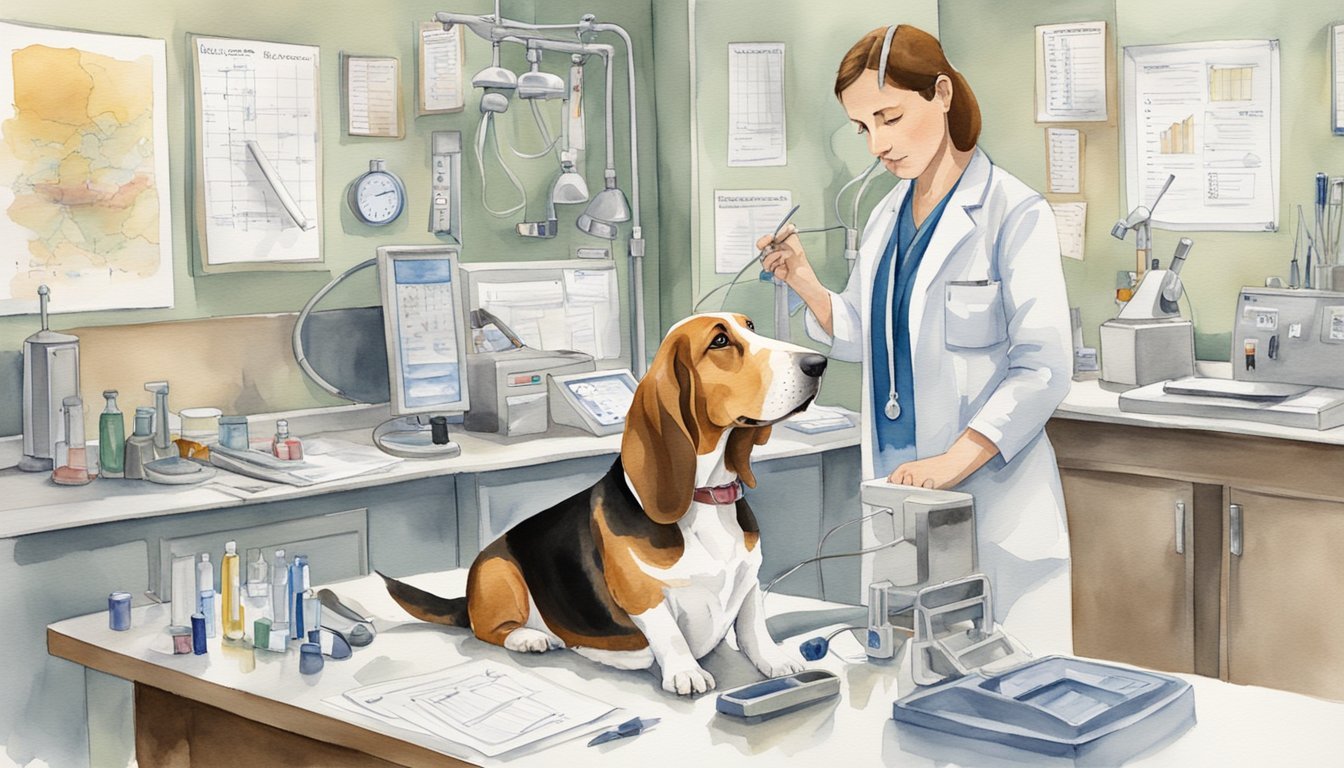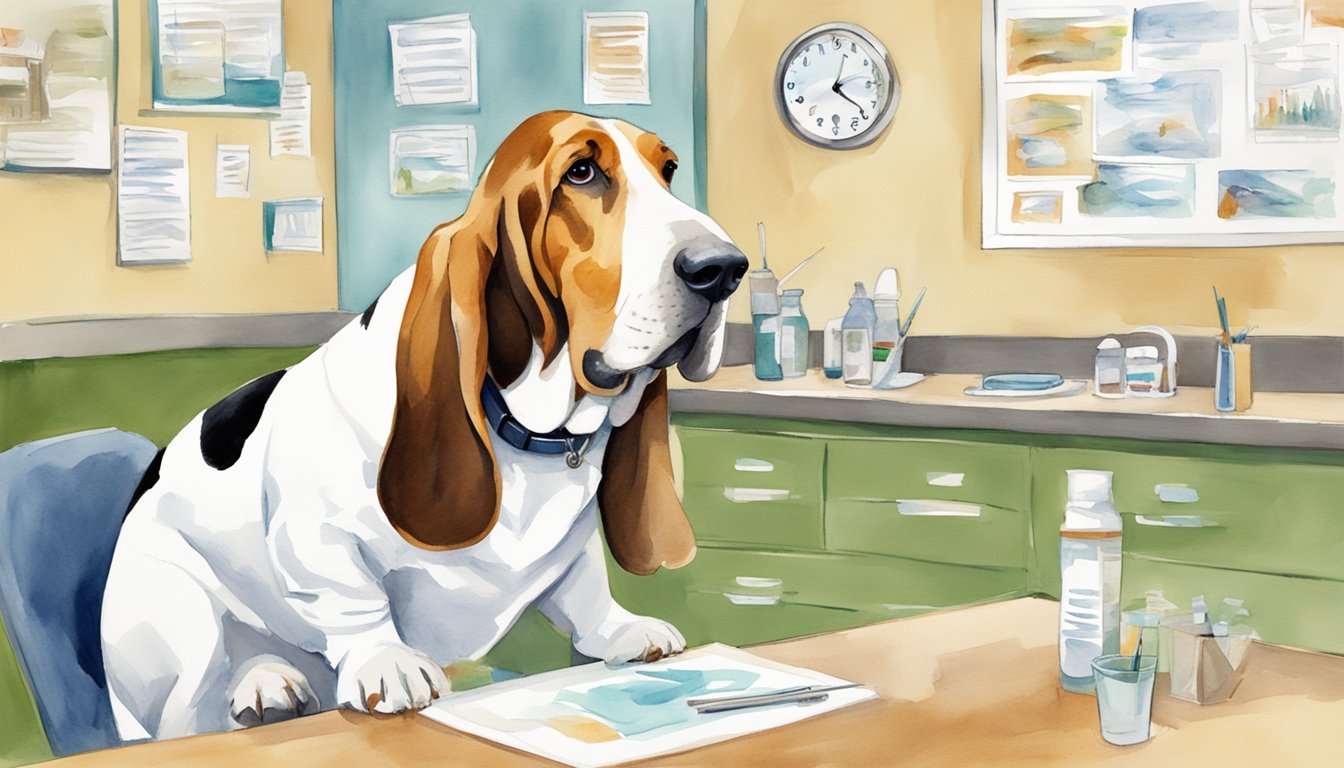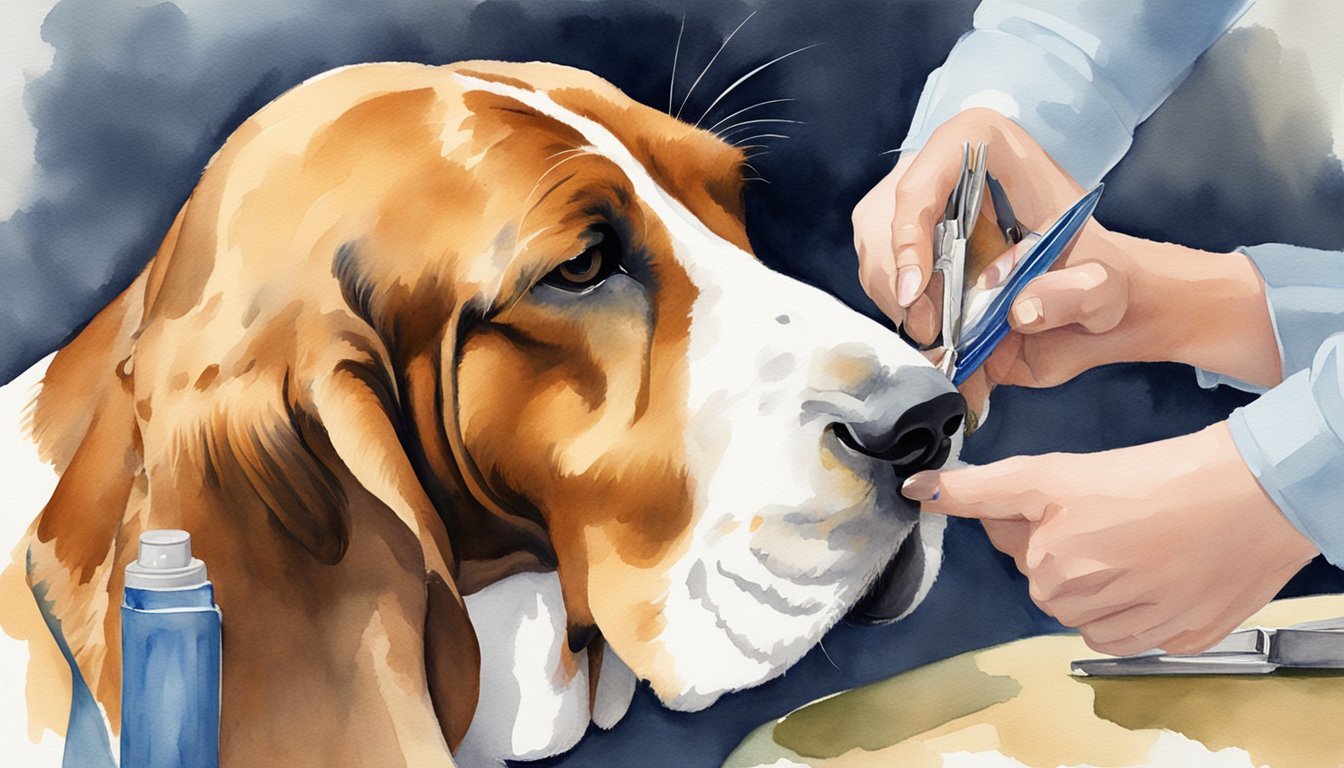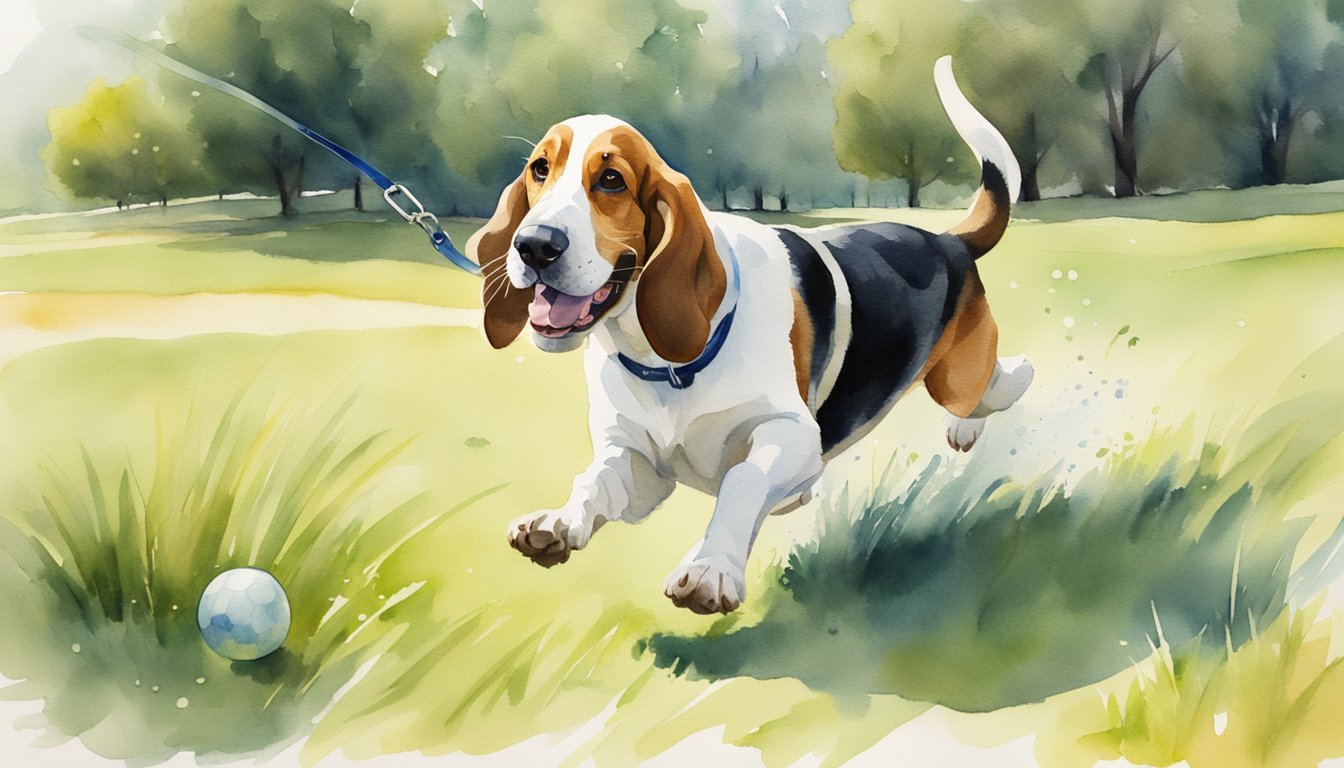7 Tips for Keeping Your Basset Hound Healthy: Essential Care Guide for Long-Eared Companions

Basset Hounds are lovable dogs known for their long ears and friendly personalities.
These dogs can make great pets, but they need proper care to stay happy and healthy.
By following some key tips, you can help your Basset Hound live a long and comfortable life.

Taking good care of your Basset Hound can prevent many common health issues. These dogs are prone to certain problems like ear infections and joint pain.
But with the right care, you can lower the chances of these issues and keep your dog feeling great.
Regular vet check-ups, a good diet, and exercise are all important parts of keeping your Basset Hound healthy.
1) Balanced diet with high-quality dog food

Feeding your Basset Hound a balanced diet is key to their health.
Choose high-quality dog food that meets their nutritional needs.
Look for foods with real meat as the first ingredient.
Basset Hounds need a mix of protein, fats, and carbohydrates.
Protein helps maintain their muscles, while fats give them energy.
Carbs provide fiber for good digestion.
Adult Basset Hounds typically need 1.5 to 2.5 cups of dry food per day.
Split this into two meals.
Adjust the amount based on your dog’s age, size, and activity level.
Puppies have different needs than adult dogs.
They need more calories to support growth. Feed Basset Hound puppies 2 ¾ to 3 ¾ cups daily between 10-12 months old.
As your Basset Hound gets older, their dietary needs change. Senior Basset Hounds may need less food, about ½ to 2 cups per day.
Choose a senior-specific formula to meet their changing needs.
Always provide fresh, clean water for your Basset Hound.
This helps with digestion and keeps them hydrated.
Watch your dog’s weight and adjust their food intake if needed to prevent obesity.
2) Regular vet check-ups

Taking your Basset Hound to the vet regularly is key to keeping them healthy.
Aim for at least one check-up per year for adult dogs.
Puppies and senior dogs may need more frequent visits.
During these visits, your vet will examine your Basset Hound from nose to tail.
They’ll check for any signs of health issues common in the breed, like hip dysplasia or eye problems.
Your vet will also make sure your dog’s vaccines are up to date.
This helps protect them from serious illnesses.
They may also recommend tests for heartworms or other parasites.
Regular check-ups can catch health problems early.
This often makes treatment easier and less expensive.
It’s especially important for Basset Hounds as they age.
Older dogs are more likely to develop certain health issues.
Don’t wait for your dog to show signs of illness.
Sometimes, Basset Hounds can hide discomfort well.
Your vet can spot problems you might miss.
Remember to bring any questions or concerns to these appointments.
Your vet can offer advice on diet, exercise, and other aspects of care.
This helps you give your Basset Hound the best possible life.
3) Daily exercise to prevent obesity
Basset Hounds are prone to weight gain.
Daily exercise is key to keeping your Basset Hound at a healthy weight.
A daily walk of 20 to 30 minutes is enough for most adult Basset Hounds.
This helps burn calories and maintain muscle tone.
You should aim for shorter walks every day rather than long weekend sessions.
Set a pace that’s comfortable for your dog.
Avoid high-impact activities or excessive running.
These can be hard on your Basset Hound’s joints and back.
Secure outdoor play areas are important.
Basset Hounds love to follow scents and may wander off if not contained.
Mix up your dog’s exercise routine.
Try different walking routes or gentle games in the yard.
This keeps things fun and interesting for your Basset Hound.
Watch for signs of tiredness during exercise.
Basset Hounds aren’t built for speed or intense activity.
Let your dog rest when needed.
Regular exercise paired with a proper diet helps prevent obesity.
This reduces the risk of health issues like back problems and joint pain in Basset Hounds.
Remember, each dog is unique.
Talk to your vet about the best exercise plan for your Basset Hound’s specific needs and health status.
4) Ear cleaning to avoid infections
Basset Hounds have long, floppy ears that can trap moisture and debris.
This makes them prone to ear infections.
Regular cleaning is key to keeping your Basset’s ears healthy.
Start by gathering the right supplies.
You’ll need a veterinarian-approved ear cleaning solution, cotton balls, and treats for rewarding your dog.
Gently lift your Basset’s ear flap and check for any signs of infection.
Look for redness, swelling, or unusual discharge.
If you spot these, contact your vet.
Pour a small amount of the cleaning solution into the ear canal.
Massage the base of the ear to help the solution work its way in.
This helps dislodge debris from the ear canal.
Use a cotton ball to wipe the inside of the ear flap and the visible part of the ear canal.
Don’t insert anything deep into the ear canal, as this can cause injury.
After cleaning, let your Basset shake its head.
This helps remove any leftover solution.
Then, gently pat the ears dry with a clean towel.
Clean your Basset’s ears once a week, or more often if recommended by your vet.
If your dog swims or gets bathed, dry their ears thoroughly afterward to prevent moisture buildup.
Remember to reward your Basset with treats after ear cleaning.
This creates a positive association with the process, making future cleanings easier.
5) Routine dental care

Keeping your Basset Hound’s teeth clean is very important.
Good dental care helps stop bad breath and tooth problems.
It also keeps your dog healthy overall.
Brush your Basset’s teeth often.
Try to do it every day if you can.
If not, aim for at least a few times a week.
Use a toothbrush and toothpaste made for dogs.
Dental chews can help clean teeth between brushings.
Give your Basset hard chews to nibble on.
These can scrape off plaque as your dog chews.
Check your dog’s mouth regularly.
Look for signs of gum disease like red or swollen gums.
Also watch for loose or discolored teeth.
If you see these signs, talk to your vet.
Basset Hounds often drool a lot.
This can lead to more dental issues.
Wipe your dog’s mouth and jowls daily to keep them clean and dry.
Take your Basset to the vet for dental check-ups.
Your vet can do a deep clean if needed.
They can also spot any issues early on.
Remember, good dental care is an ongoing task.
Make it part of your daily routine to keep your Basset Hound’s mouth healthy.
6) Proper grooming to maintain coat health

Basset Hounds have short, smooth coats that need regular care. Brush your Basset Hound 2-3 times per week to remove loose hair and spread natural oils.
This keeps their coat healthy and reduces shedding.
Use a rubber grooming mitt or soft bristle brush.
Be gentle and brush in the direction of hair growth.
Don’t forget areas like the belly and armpits.
Bathe your Basset Hound every 4-6 weeks or when they get dirty.
Use a dog shampoo made for sensitive skin.
Rinse well to avoid skin irritation.
Pay special attention to your Basset’s ears.
Their long, floppy ears can trap moisture and dirt.
Clean them weekly with a dog ear cleaner and cotton ball.
Check for fleas, ticks, and skin issues during grooming.
Look for any bumps, rashes, or sore spots.
Tell your vet if you notice anything unusual.
Trim your Basset’s nails every 2-3 weeks.
If you hear clicking on hard floors, the nails are too long.
Use dog nail clippers or a grinder.
Regular grooming helps you bond with your Basset Hound.
It also lets you spot health problems early.
Make grooming a positive experience with treats and praise.
7) Heartworm prevention
Heartworm disease can be dangerous for your Basset Hound.
It’s caused by parasites spread through mosquito bites.
The good news is that it’s easy to prevent.
Give your Basset Hound heartworm prevention medication regularly.
Most vets recommend monthly pills or topical treatments.
Some options protect against other parasites too.
Stick to a consistent schedule.
Mark your calendar or set phone reminders so you don’t forget doses.
Missing even one month can put your dog at risk.
Get your Basset Hound tested for heartworms every year.
This helps catch any infections early.
Your vet will likely do this test during annual check-ups.
Keep your yard free of standing water where mosquitoes breed.
This can help reduce your dog’s exposure to infected mosquitoes.
Consider using pet-safe mosquito repellents when outdoors in buggy areas.
Ask your vet for recommendations.
Remember that indoor dogs need protection too.
Mosquitoes can get inside homes.
Year-round prevention is best, even in colder months.
Proper Nutrition

Feeding your Basset Hound the right food in the right amounts is key to keeping them healthy.
A good diet helps prevent weight gain and other health issues.
Balanced Diet and Ingredients
Your Basset Hound needs a mix of protein, fats, and carbs. Look for dog food with meat as the first ingredient.
Good options include chicken, beef, or fish.
Avoid foods with lots of fillers or artificial additives.
These don’t give your dog the nutrients they need.
Make sure the food has vitamins and minerals too.
These help keep your Basset’s coat shiny and their bones strong.
Some Basset Hounds have food allergies.
If you notice itching or stomach issues, talk to your vet about switching foods.
Feeding Schedule and Portion Control
Adult Basset Hounds usually need 1.5 to 2.5 cups of dry food per day.
Split this into two meals – one in the morning and one at night.
Use a measuring cup to control portions.
Don’t guess or overfill the bowl.
Too much food can lead to weight gain.
Adjust the amount based on your dog’s age, weight, and activity level.
Older or less active dogs need fewer calories.
Always have fresh water available.
Change it daily to keep it clean.
Avoid giving table scraps.
These can upset your Basset’s stomach and add extra calories.
Exercise and Physical Activity

Basset Hounds need regular exercise to stay healthy and happy.
A good mix of daily walks and fun activities can keep your dog fit and prevent weight gain.
Daily Exercise Needs
Basset Hounds require daily walks of 20 to 30 minutes.
This helps maintain their weight and keeps them active.
Short, frequent walks are better than long weekend sessions.
You should aim for consistent exercise each day.
This routine helps your Basset Hound stay healthy and prevents boredom.
Remember, these dogs have short legs.
They may tire quickly on long walks.
Pay attention to your dog’s energy level and adjust the walk length as needed.
Appropriate Activities for Basset Hounds
Basset Hounds enjoy gentle activities that don’t strain their bodies.
Short play sessions in the yard are great for them.
Try these fun activities:
- Fetch with soft toys
- Hide-and-seek games
- Gentle tug-of-war
- Nose work exercises
Swimming can be a good low-impact exercise.
But always supervise your Basset Hound near water.
Avoid high-impact activities like jogging or jumping.
These can hurt their long backs and short legs.
Remember to keep exercise sessions short.
Your Basset Hound may overheat easily due to their thick coat.
Routine Health Check-Ups
Regular vet visits and preventive care are key to keeping your Basset Hound healthy.
These check-ups help catch issues early and protect your dog from common diseases.
Importance of Regular Vet Visits
Take your Basset Hound to the vet at least once a year.
These visits let the vet check your dog’s overall health and spot any problems.
During the check-up, the vet will:
• Examine your dog’s eyes, ears, teeth, and skin
• Listen to their heart and lungs
• Feel for lumps or swelling
• Check their weight
Regular vet visits can help find health issues before they get worse.
This is very important for Basset Hounds, as they can have certain breed-specific problems.
Tell your vet about any changes in your dog’s behavior or habits.
This info helps the vet give your Basset Hound the best care possible.
Vaccinations and Preventative Care
Keep your Basset Hound’s vaccinations up to date to protect them from serious diseases.
Your vet will create a vaccine plan based on your dog’s age, health, and lifestyle.
Common vaccines for Basset Hounds include:
• Rabies
• Distemper
• Parvovirus
• Hepatitis
Preventative care also includes:
• Regular deworming
• Flea and tick prevention
• Heartworm medication
Ask your vet about the right schedule for these treatments.
They’ll help keep your Basset Hound safe from parasites and other health threats.






